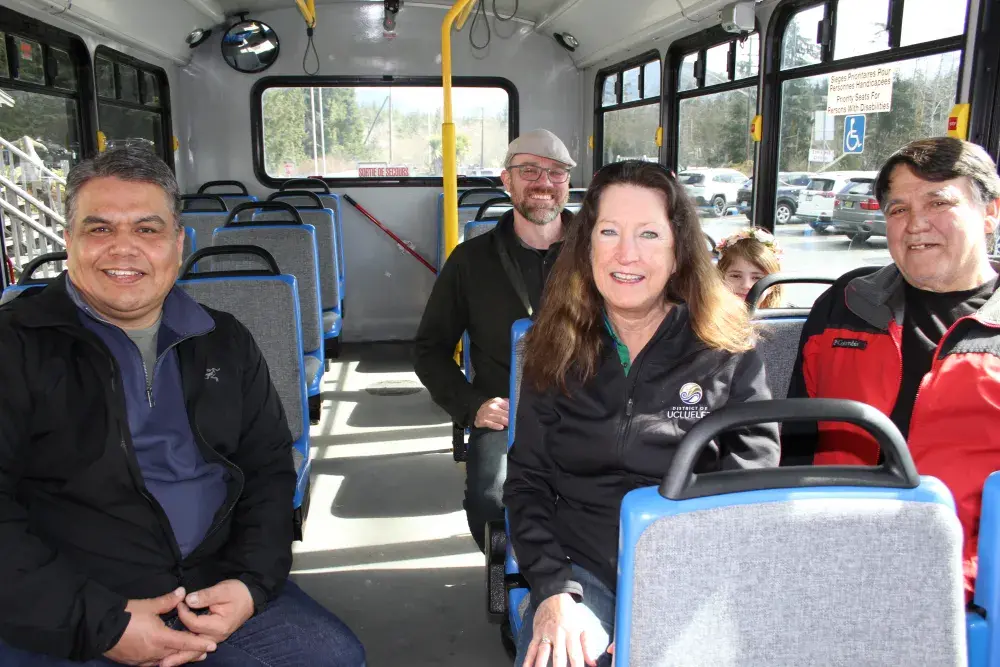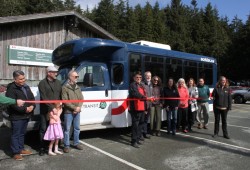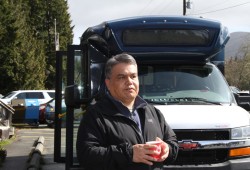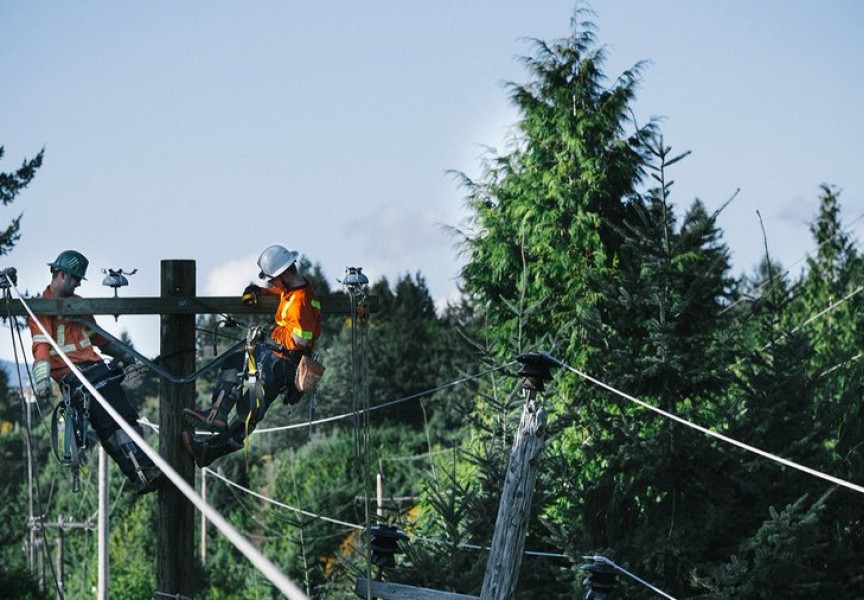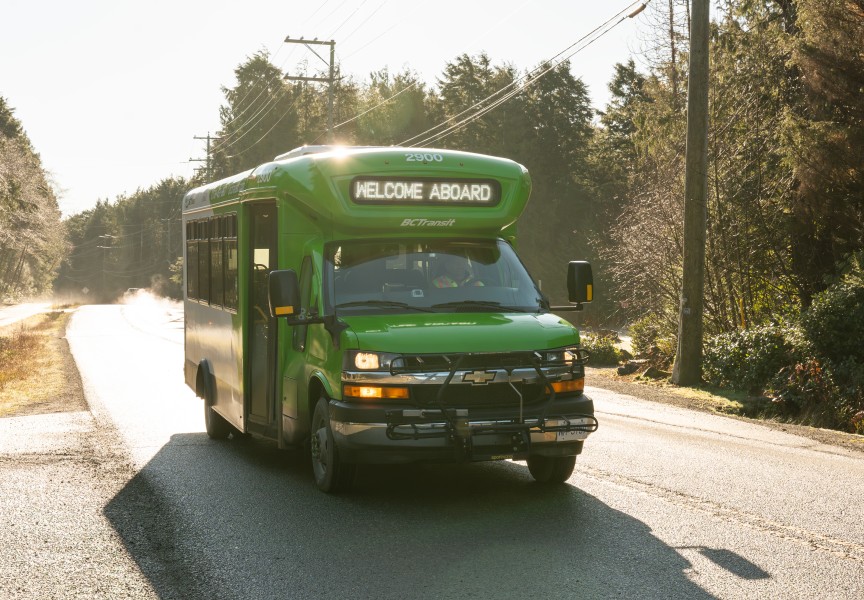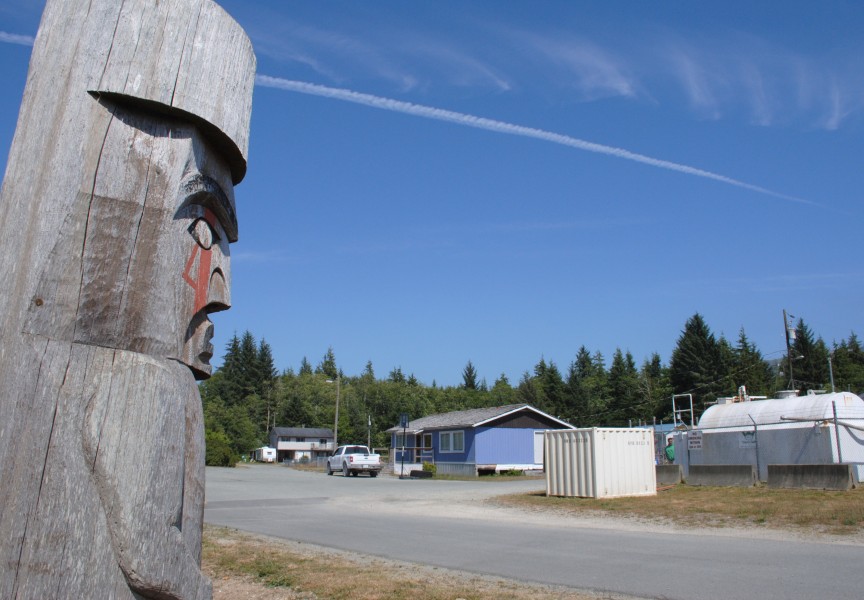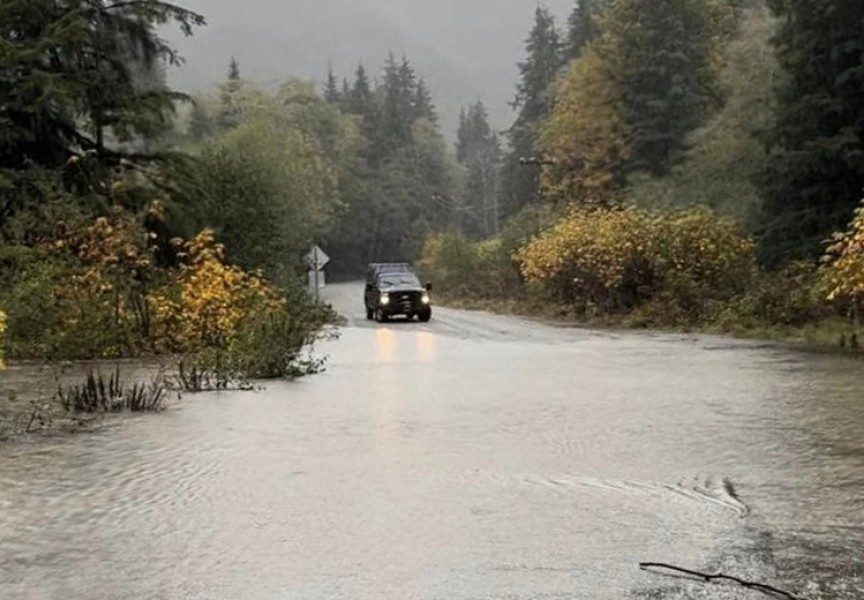Over its first week of operating, the introduction of a public bus in Clayoquot Sound has already enormously benefitted those in Tla-o-qui-aht communities, says the First Nation’s elected chief.
“It’s going to make a huge difference, it already has since it’s been operating,” said Tla-o-qui-aht Chief Councillor Elmer Frank at an event on April 9 marking the start of West Coast Transit, which began running buses in the region April 2. “Yesterday the morning shuttle was down or not operating. It did affect a lot of our members trying to get to work and from work, especially with the cost of the gas prices now. I think people are going to start taking advantage of the transit.”
The service is being offered by the Alberni-Clayoquot Regional District, running buses between Tofino and Ucluelet seven days a week. With two buses running on weekdays, service is about every hour at stops that include locations in Ty-Histanis, Esowista and the Yuułuʔiłʔatḥ community of Hitacu. The first bus leaves the Ucluelet Community Centre at 6:30 a.m. on weekdays, ending its operations by stopping at the same location at 7 p.m.
“We have people trying to get across to work or get from one place to another,” said Chuck McCarthy, president of Yuułuʔiłʔatḥ Government, during the event. “My daughters went from Hitacu over to Tofino, sat there, had lunch and came back on the bus. That’s a start, not everybody can drive.”
A fare is $5.50, or $10 for a day pass. The bus operates on a cashless system using a phone app or tickets purchased at the Tofino or Ucluelet Co-op grocery stores. With one bus running on weekends, service is approximately every two hours.
This is the first time the region has benefitted from public transit in over a decade, as Frank recalls a bus service owned by the Yuułuʔiłʔatḥ, Toquaht, Tla-o-qui-aht, Ahousaht and Hesquiaht First Nations that operated for six or seven years. Island Link began operating that service approximately 20 years ago.
Lately members who don’t have a vehicle have had to rely on ride sharing services.
“It’s been a real challenge for some of our people to have to pay $40 or $50 for ride sharing or something when they have to go to work,” said Frank. “I think that it’s really going to help with costs of looking after those who are in need of rides to and from work or to and from the grocery store.”
Affordability is a particularly critical issue in the region, where a living wage of $26.51 makes it one of the most expensive places to live in B.C., according the Clayoquot Biosphere Trust’s 2023 Vitals Signs report. The report stated that 68 per cent of those in region use a car to get to work, while 21 per cent walk and six per cent ride a bike to their job.
“It’s a real high cost to stay employed, and with the transit and the subsidies that come with it, that’s certainly going to help with going to work affordably,” said Frank.
The bus also attends to a safety concern, as hitchhiking remains common in the west coast region. Although it has declined in recent years, 15 per cent of youth surveyed for the Vital Signs report said they hitchhike from time to time.
“I was one of those people that had to hitchhike from town to town for appointments and work, and actually even out to Port Alberni for appointments,” said Vaida Siga, the ACRD’s director for Long Beach, at the West Coast Transit event on April 9. “It’s a safety issue that’s being addressed, it’s a climate change issue that’s being addressed.”
“It will be a key part of reducing the potential isolation residents may feel due to the lack of safe and affordable transportation options,” added Penny Cote, the ACRD’s Sproat Lake director.
The service has been years in the making, and at least for its first year will be funded by the municipalities of Ucluelet and Tofino, the Long Beach area, as well as the Toquaht, Yuułuʔiłʔatḥ and Tla-o-qui-aht First Nations. The total annual cost of the service is approximately $670,000, and it is yet to be determined how much of this will be covered by fares.
“It’s being funded through a tax requisition through the partner communities,” said ACRD Operations Manager Eddie Kunderman, noting that securing provincial funding has been a challenge. “The province has had a tough time with COVID, there were issues with bus procurement in the very first year.”
But provincial support is expected to come some time in 2025, as the ACRD received confirmation this month that BC Transit funds will be in place next year.
“It has been confirmed that it will be available,” said Kunderman. “The plan is that BC Transit eventually will step in and it will be a BC Transit service.”

